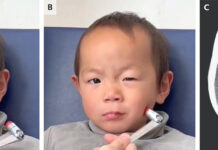Study shows association between diminished cognitive function and tooth loss
Around 5 million people over the age of 65 years suffer from dementia. Studies have shown a potential relationship between tooth loss and cognitive function. Subsequently, according to a new analysis led by researchers at NYU Rory Meyers College of Nursing, the risk of cognitive decline grows with each tooth loss. However, this result does not apply to older adults with dentures, suggesting that a timely treatment with dentures plays a role in preventing cognitive decline.
The Centers for Disease Control and Prevention states that about one in six adults over the age of 65 have lost all their teeth. Previous studies have also shown an association between diminished cognitive function and tooth loss. This association can be explained using different approaches through research. For example, one of the theories states that missing teeth leads to a difficulty in chewing, contributing to nutritional deficiencies. This can lead to and promote changes in the brain.
There is ample research that also points out the connection between gum disease being a leading cause of tooth loss and cognitive decline. In addition, life-long socioeconomic disadvantages are also a contributing risk factor for cognitive decline.
The staggering number of cases of Alzheimer’s disease and dementia increases the need for a deeper understanding of the connection between poor oral health and cognitive decline
According to Bei Wu, PhD, Dean’s Professor in Global Health at NYU Rory Meyers College of Nursing and co-director of the NYU ageing incubator, as well as the study’s senior author, “Given the staggering number of people diagnosed with Alzheimer’s disease and dementia each year, and the opportunity to improve oral health across the lifespan, it’s important to gain a deeper understanding of the connection between poor oral health and cognitive decline.”
Wu and her colleagues conducted a study on tooth loss and cognitive impair. The meta-analysis use 14 longitudinal studies in their analysis with a total of 34,074 adults and 4,689 people with diminished cognitive function. The research concluded that the risk of developing cognitive impairment and dementia is 1.48 times and 1.28 times higher in adults with more tooth loss.
In addition, adults with missing teeth and without dentures are more likely to have cognitive impairment compared to adults with dentures. The study concluded that the association of tooth loss and cognitive impairment was not significant with participants who had dentures.
Furthermore, if a greater number of teeth are missing then it is linked with a higher risk of cognitive decline. The findings confirmed the relationship between tooth loss and cognitive decline. Each missing tooth increases the risk of cognitive impairment by 1.4%. The findings of the study substantially strengthen the evidence that links tooth loss with cognitive decline and, “underscore the importance of maintaining good oral health and its role in helping to preserve cognitive function,” said Wu.
References
Dose-Response Meta-Analysis on Tooth Loss With the Risk of Cognitive Impairment and Dementia https://www.sciencedirect.com/science/article/abs/pii/S1525861021004734




